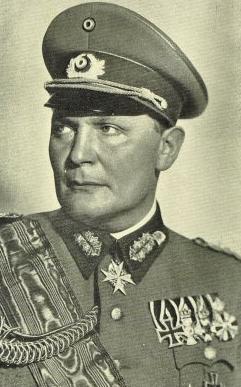Hermann Göring
From Kaiserreich
Hermann Wilhelm Göring (born in January, 12 1893 in Rosenheim, Germany) is a German fighter pilot, politician and colonial adminstrator. He is the second and current Staathalter of the Freistadt Mittelafrika since 1934.
Family background and relatives
Göring was born at the sanatorium Marienbad in Rosenheim, Bavaria. His father Heinrich Ernst Göring had been the first Governor-General of the German protectorate of South West Africa (Right now in Mittelafrika) as well as being a former cavalry officer and member of the German consular service. Göring had among his patrilineal ancestors Eberle/Eberlin, a Swiss-German family of high bourgeoisie.
In an historical coincidence, Göring was related via the Eberle/Eberlin line to Jacob Burckhardt, a great Swiss scholar of art and culture who was a major political and social thinker as well an opponent of nationalism and militarism, who rejected German claims of cultural and intellectual superiority and predicted a cataclysmic 20th century in which violent demagogues, whom he called "terrible simplifiers," would play central roles.
Göring's mother Franziska "Fanny" Tiefenbrunn came from a Bavarian peasant family. The marriage of a gentleman to a woman from lower class occurred only because Heinrich Ernst Göring was a widower. Göring was one of five children; his brothers were Albert Göring and Karl Ernst Göring, and his sisters were Olga Therese Sophia and Paula Elisabeth Rosa Göring, the last of whom were from his father's first marriage.
Early life and Ritter von Epenstein
Göring later claimed his given name was chosen to honour the Arminius who defeated the legions of Rome at Teutoburg Forest. However the name was possibly to honour his godfather, born Hermann Epenstein. Epenstein, whose father was an army surgeon in Berlin, became a wealthy physician and businessman and a major if not paternal influence on Göring's childhood. Much of Hermann's very early childhood, including a lengthy separation from his parents when his father took diplomatic posts in Africa and in Haiti (climates ruled too brutal for a young European child), was spent with governesses and with distant relatives. However, upon Heinrich Göring's retirement ca. 1898 his large family, supported solely on Heinrich's civil service pension, became for financially practical reasons the houseguests of their longtime friend and Göring's probable namesake, a man whose minor title (acquired through service and donation to the Crown) made him now known as Hermann, Ritter von Epenstein.
Ritter von Epenstein purchased two largely dilapidated castles, Burg Veldenstein in Bavaria and Schloss Mauterndorf near Salzburg, Austria, whose very expensive restorations were ongoing by the time of Hermann Göring's birth. Both castles were to be residences to the Göring family, their official "caretakers" until 1913. Both castles were also ultimately to be his property. In 1914 he tried to commit suicide; however, he was found by his mother,and was sent to the hospital. He survived after cutting his wrist and was soon sent back home. In 1915 he joined the army and fought in the Battle of the Somme.
According to some biographers of both Hermann Göring and his younger brother Albert Göring, soon after the family took residence in his castles, von Epenstein began an adulterous relationship with Frau Göring and may in fact have been Albert's father. (Albert's physical resemblance to von Epenstein was noted even during his childhood and is evident in photographs.) Whatever the nature of von Epenstein's relationship with his mother, the young Hermann Göring enjoyed a close relationship with his godfather.
Relations between the Göring family and von Epenstein became far more formal during Göring's adolescence (causing Mosley and other biographers to speculate that perhaps the theorised affair ended naturally or that the elderly Heinrich discovered he was a cuckold and threatened its exposure). By the time of Heinrich Göring's death, the family no longer lived in a residence supplied by or seemed to have much contact at all with von Epenstein (though the family's comfortable circumstances indicate the Ritter may have continued to support them financially). Late in his life, Ritter von Epenstein wed a singer, Lily, who was half his age, bequeathing her his estate in his will, but requesting that she in turn bequeath the castles at Mauterndorf and Veldenstein to his godson Hermann upon her own death.
First marriage
Karin divorced her estranged husband, Niels Gustav von Kantzow, in December 1922. She married Göring on 3rd January, 1923 in Stockholm. Von Kantzow behaved generously. He provided a financial settlement which enabled Karin and Göring to set up their first home together in Germany. It was a hunting lodge at Hochkreuth in the Bavarian Alps, near Bayrischzell, some 50 miles from Munich. Both Karin and Göring were ardent nationalists and honoured the German victory in the first Weltkrieg.

